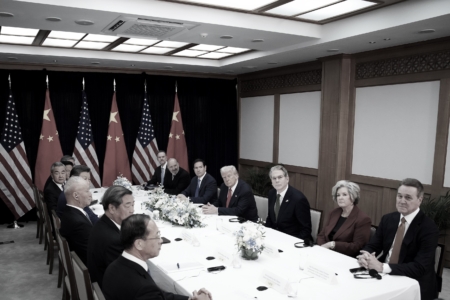Direct translation
Internal sources: The new CCP power core has halted a major decision
—Following the Fourth Plenary Session, the CCP's policy towards the US softened. Scholars analyze this.
Reporter : Sun Ruihou / Editor : Fang Xun / https://www.aboluowang.com/2025/1031/2298812.html / Image : On the morning of October 30th, U.S. President Donald Trump held talks with Chinese Communist Party leader Xi Jinping at Gimhae Air Base in Busan, South Korea.

Su Ziyun, Director of the Institute of Strategic and Resources Studies at the Institute for National Defense and Security Research in Taiwan, told The Epoch Times that the Trump-Xi meeting was at least outwardly stable, suggesting a period of stability in the Indo-Pacific conflict and a temporary easing of the U.S.-China trade war.
Su Ziyun stated that this is tantamount to a temporary truce, with both sides waving a white flag.
"The rare earth issue will be buffered for a year, and then reviewed again. Basically, each side has different strategies. Beijing still wants to use rare earths as leverage when necessary, but the West will quickly reduce its dependence on rare earths from China."
Sun Guoxiang, a full-time professor in the Department of International Affairs and Business at Nanhua University in Taiwan, told The Epoch Times that the outcome of this meeting is consistent with the CCP's past "delaying tactics" logic: making concessions on low-cost, negotiable issues while delaying on core strategic issues. While the Xi-Trump meeting appeared amicable, it was more like a diplomatic painkiller, offering temporary relief but unable to alter the long-term structure of confrontation.
Regarding rare earths, veteran media professional Guo Jun stated on the "Elite Forum" program that Xi Jinping's approach before the Fourth Plenary Session aimed to forcefully play the rare earth card, initiating so-called global long-arm jurisdiction over rare earths and restricting exports of raw materials. The result was a direct US countermeasure, launching a comprehensive substitution plan. London Metal Exchange rare earth futures plummeted by 12% that day, and Chinese rare earth stocks also plunged. "This blow made many within the CCP feel that this path was ultimately unworkable."
Guo Jun revealed that, according to internal sources, the new central power core intervened and halted this approach; otherwise, the U.S.-China trade negotiations would have been impossible. "This is a very clear signal that the diplomatic and economic systems are no longer under Xi Jinping's control."
Furthermore, in recent weeks, the CCP has suddenly changed its tune, no longer mentioning the rise of the East and the decline of the West, nor discussing self-reliance and control, but instead starting to talk about the U.S.-China partnership. This is quite unlike Xi Jinping's past "wolf warrior" diplomacy. "This approach is clearly not from Xi Jinping, but from the new power core of the CCP Central Committee seeking self-preservation. They know that if the Chinese economy continues like this, the entire CCP will collapse."
Several scholars have noted a significant shift in official rhetoric after the Fourth Plenary Session of the 20th CPC Central Committee. Regarding Xi Jinping's repeated mentions of "daring to struggle and being good at struggle" at the meeting, Beijing academics stated that while this hardline language is still retained, it has lost its previous offensive connotation. This includes Xi Jinping's willingness to meet with U.S. President Trump and reach a series of compromise agreements, including those covering rare earth exports.
Mr. Tang, a political observer in Beijing, stated in an interview that this shift by the CCP reflects a repositioning of its policy focus. "Struggle" is no longer the main theme of foreign policy. He said, "This shows that the CCP leadership has realized that hardline diplomacy can no longer sustain the economic reality. The domestic economy is a mess, and some ordinary people are almost starving."
Mr. Ge, a scholar of literature and history, stated that the most attention-grabbing aspect of the Fourth Plenary Session report was the reappearance of the phrase "adhering to economic construction as the central task" in Article 4. This signifies a forced adjustment to the power structure, representing a strategic contraction and marking a loosening of Xi Jinping's dominant position within the Party.
Scholars analyze that this rapid concession is the result of a reassessment by the political decision-making body. The Fourth Plenary Session of the 19th CPC Central Committee may become a watershed moment for internal compromise. Some officials favor maintaining economic stability and oppose further hardline confrontation that drains external resources. "This shift is not merely a tactical adjustment, but a rewriting of policy logic, reflecting Xi Jinping's forced bowing to reality."
Mr. Ge analyzes that the underlying reasons for this turn also include internal disagreements within the Party regarding the future direction. He says, "Some high-ranking Party members believe that continued hardline stances will trigger more severe external blockades and capital outflows."
Scholars state that "the failure to reach a political consensus at the Fourth Plenary Session led Xi Jinping to proactively back down diplomatically to avoid greater upheaval."
Beijing political observers point out that the CPC document's reiteration of "taking economic construction as the center" is not only a policy adjustment but also a form of political defense. One scholar stated, "This is not just a turning point, but a repair. Beijing needs to use a facade of stability to mask internal turmoil."



No comments:
Post a Comment